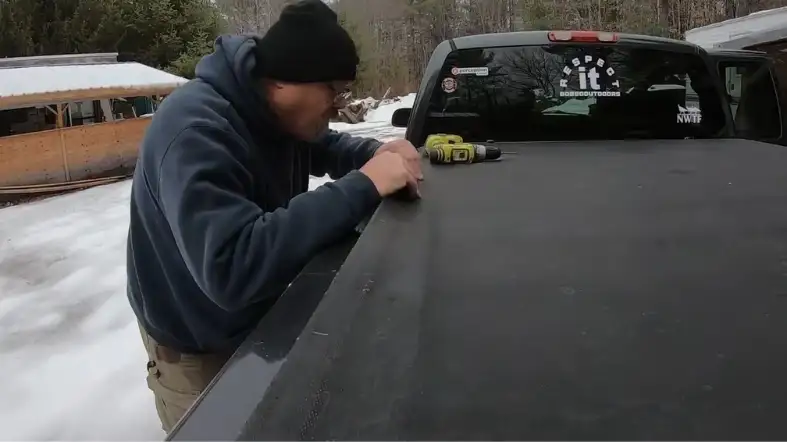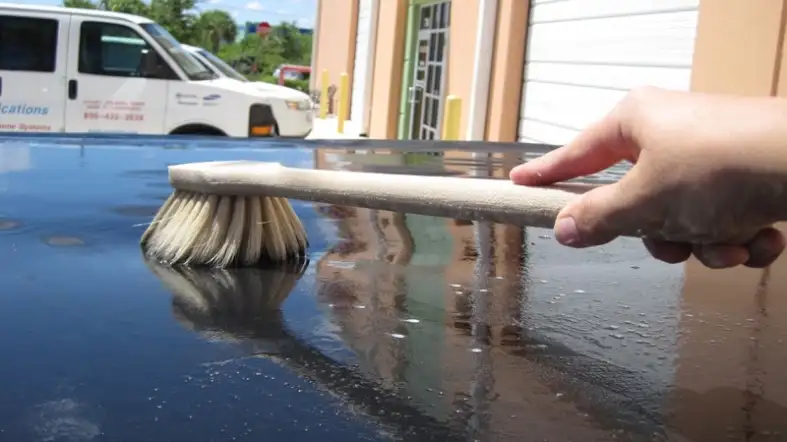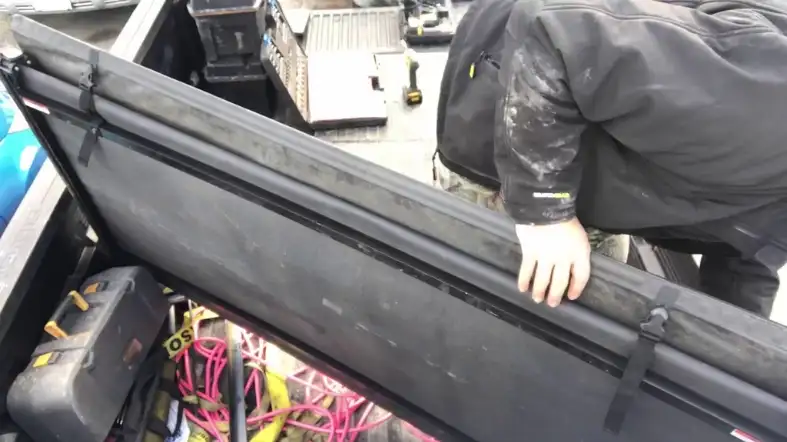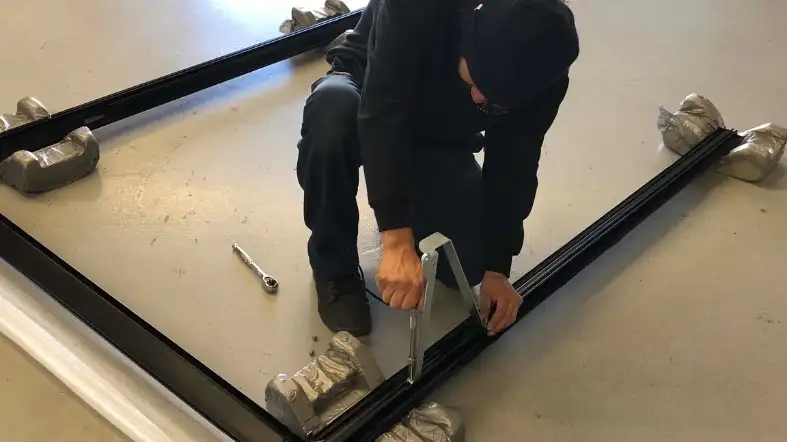Are you wondering if it’s possible to repair a tonneau cover? Don’t worry; we’ve got you covered! This article explores the options and techniques for repairing tonneau covers.
Whether you’ve encountered a tear, a broken latch, or any other issue, we’ll provide you with the necessary information to get your tonneau cover back in top shape.

Can You Repair A Tonneau Cover?
Tonneau covers can be repaired, depending on the damage. Tears or holes can often be patched up, and broken components can be replaced.
7 Tonneau Cover Problems and How to Fix Them?
Here are 7 tonneaus that cover common problems and how to fix them:
Fading and Discoloration: Restoring Your Tonneau Cover’s Vibrancy
- Cleaning the Cover: Use mild soap and water to scrub away dirt and grime. Rinse thoroughly and allow it to dry.
- Applying UV Protectant: Coat the cover with a UV protectant spray to prevent further fading and discoloration.
Rips and Tears: Patching Up Your Tonneau Cover
- Assessing the Damage: Identify the size and location of the rip or tear.
- Applying Patch Kits: Use a tonneau cover patch kit to mend the damaged area. Follow the kit’s instructions for optimal results.
Loose or Broken Fasteners: Securing Your Tonneau Cover
- Tightening Fasteners: Inspect and tighten any loose bolts or screws that secure the tonneau cover to the truck bed.
- Replacing Broken Fasteners: If a fastener is damaged beyond repair, replace it with a suitable replacement from a hardware store.
Leaking: Sealing Your Tonneau Cover
- Cleaning and Lubricating Seals: Remove debris and clean the seals with mild detergent. Apply a silicone-based lubricant to ensure a proper seal.
- Adjusting Tension: If the cover’s tension is too loose, tighten it according to the manufacturer’s instructions to prevent leaks.
Sagging: Restoring Tension to Your Tonneau Cover
- Adjusting Support Bars or Cables: Follow the tonneau cover’s manual to tighten or replace support bars or cables to restore proper tension.
- Replacing Worn-out Cover Material: If the cover material has stretched excessively, consider replacing it to eliminate sagging.
Locking Mechanism Issues: Fixing Locking Mechanism Problems
- Lubricating the Lock: Apply graphite or silicone-based lubricant to the locking mechanism to ensure smooth operation.
- Adjusting the Latch: If the latch is misaligned or not engaging correctly, adjust it carefully to ensure a secure lock.
Bowed or Warped Cover: Straightening Your Tonneau Cover
- Applying Heat: Use a heat gun or hairdryer to warm the bowed or warped section of the cover. Gently shape it back to its original form.
- Using Support Bars or Cables: Install additional support bars or cables to prevent future bowing or warping.
How Do You Clean And Shine A Tonneau Cover?

Here is how to clean and shine a tonneau cover:
Gather Your Cleaning Supplies
To clean and shine your tonneau cover, gather the following supplies:
- Mild soap or specialized tonneau cover cleaner.
- Soft-bristle brush or sponge.
- Microfiber cloth or towel.
- Water source (hose or bucket).
- Vinyl protectant or UV protectant spray.
Rinse Off Loose Debris
Begin by rinsing off loose dirt and debris from the tonneau cover using a hose or bucket of water.
This helps prevent scratching the cover during the cleaning process.
Prepare the Cleaning Solution
Mix a mild soap or specialized tonneau cover cleaner with water according to the product instructions.
Avoid using harsh chemicals or abrasive cleaners, as they can damage the cover.
Scrub the Cover
Dip a soft-bristle brush or sponge into the cleaning solution and gently scrub the tonneau cover, working in small sections.
Pay extra attention to areas with stains or stubborn dirt. Avoid using excessive pressure to prevent scratching or damaging the cover.
Rinse Thoroughly
After scrubbing the cover, rinse it thoroughly with clean water to remove any residue and soap suds. Ensure that all cleaning solution is completely washed away.
Dry the Cover
Use a microfiber cloth or towel to dry the tonneau cover. Pat it gently to absorb moisture without causing any friction that could lead to scratches.
Apply Vinyl or UV Protectant
Once the cover is dry, apply a vinyl protectant or UV protectant spray to enhance its shine and protect it from harmful UV rays.
Follow the product instructions for application, ensuring even coverage across the entire surface of the cover.
Buff and Shine
Using a clean microfiber cloth, gently buff the tonneau cover to bring out its shine. This step helps remove any excess protectant and leaves a polished finish.
When to Seek Professional Tonneau Cover Repairs?

Here is when to seek professional tonneau cover repairs:
Extensive Damage or Tears
If your tonneau cover has extensive damage, such as large rips or tears that are beyond your repair capabilities, it’s time to seek professional help.
These professionals have the expertise to assess the damage and provide appropriate repair solutions.
Malfunctioning Components
When components of your tonneau cover, such as latches, hinges, or support bars, are malfunctioning or broken, it’s best to consult a professional.
They can accurately diagnose the issue and determine whether a repair or replacement is necessary.
Warranty Coverage
If your tonneau cover is still under warranty, it’s recommended to seek professional repairs from an authorized service center.
Attempting DIY repairs could void the warranty, so it’s essential to follow the manufacturer’s guidelines.
Structural or Frame Damage
In the case of severe structural or frame damage, it’s crucial to consult a professional.
They can evaluate the extent of the damage and advise on whether repairs are possible or if a replacement is required for the safety and functionality of your tonneau cover.
Leaking Issues
Persistent leaking issues despite attempts to fix them yourself indicate the need for professional assistance.
A professional can identify the source of the leaks and apply suitable repair methods to ensure proper sealing.
Specialty or Custom Covers
If you have a specialty or custom tonneau cover, it’s advisable to consult professionals who specialize in repairing and maintaining such covers.
They have the knowledge and expertise to handle unique materials, designs, or features specific to your cover.
Lack of Repair Experience
If you lack experience in tonneau cover repairs or are unsure about the best course of action for your specific problem, seeking professional assistance is recommended.
They can provide expert advice and perform the necessary repairs with precision.
Benefits of Repairing vs. Replacing a Tonneau Cover

Here are the benefits of repairing vs. replacing a tonneau cover:
Cost Savings
Repairing your tonneau cover is often more cost-effective than replacing it entirely.
By addressing specific issues through repairs, you can save money on purchasing a brand-new cover.
Repairs typically require fewer resources and materials, making them a budget-friendly option.
Preserving the Original Look
Repairing your tonneau cover allows you to maintain its original appearance.
If you’re attached to the design, color, or texture of your current cover, repairing it helps preserve these aesthetic qualities.
By addressing specific damages, you can keep the cover looking as close to its original state as possible.
Retaining Functional Features
Tonneau covers often come with various functional features such as locking mechanisms, weather seals, or integrated accessories.
Repairing the cover allows you to retain these features and ensure they continue to function properly.
This can be especially beneficial if you rely on specific functionalities for cargo protection or security.
Minimal Disruption
Replacing a tonneau cover involves removing the existing cover, potentially affecting the alignment, fit, or overall appearance of your truck bed.
Repairing the cover minimizes this disruption since it only focuses on fixing the specific problem areas.
This means you can get your cover back in working condition without undergoing a complete replacement process.
Environmental Considerations
Opting for tonneau cover repairs aligns with sustainable practices by reducing waste.
Repairing instead of replacing helps minimize the number of discarded covers, reducing your environmental footprint.
By choosing repairs, you contribute to a more eco-friendly approach and promote resource conservation.
Convenience and Time-Saving
Repairing a tonneau cover is often a quicker process compared to finding, purchasing, and installing a new cover.
Once you identify the specific issues and obtain the necessary repair materials, you can promptly fix the problem and get your tonneau cover back in use.
This convenience saves you time and allows you to resume using your truck bed sooner.
Flexibility in Repair Options
Repairing a tonneau cover provides flexibility in choosing the repair method that suits your needs.
Whether patching up tears, replacing specific components, or reinforcing weakened areas, you can tailor the repairs to address the specific problems you’re facing.
This customization ensures that the repaired cover meets your requirements.
Is It Possible to Repair a Tonneau Cover If You Have a Roll Bar Installed?
Is It Possible to Repair a Tonneau Cover If You Have a Roll Bar Installed? Repairing a tonneau cover is possible even when using a tonneau cover with a roll bar. By carefully assessing the damage, you can determine if simple fixes like patching or sewing will suffice or if professional repair is needed. Consultations with experts can provide tailored solutions for preserving the functionality and aesthetics of your tonneau cover.
Frequently Asked Questions
What Are The Common Types Of Tonneau Cover Repairs?
Common tonneau cover repairs include patching up tears or holes, replacing broken components, fixing leaking issues, and addressing issues with the locking mechanism.
Should I Repair Or Replace My Tonneau Cover?
If the damage is minor and repairable, it is usually more cost-effective to repair the tonneau cover.
However, if the damage is extensive or the cover is beyond repair, it may be necessary to replace it.
Can I Repair My Tonneau Cover Myself?
Some minor repairs, such as patching small tears, can be done by yourself.
However, more complex repairs or issues may require professional assistance.
How Much Does The Tonneau Cover Repair Cost?
The cost of tonneau cover repair can vary depending on the extent of the damage and the type of repair needed.
It is best to consult a professional for an accurate estimate.
Are Tonneau Cover Repairs Covered Under Warranty?
Warranty coverage for tonneau cover repairs depends on the specific terms and conditions of the manufacturer’s warranty.
Review your warranty documentation or contact the manufacturer for more information.
How Long Does Tonneau Cover Repair Take?
The repair timeline for a tonneau cover can vary depending on the complexity of the repair and the availability of replacement parts.
Simple repairs may take a few hours, while more extensive repairs may require more time.
Final Words
With the right tools and techniques, repairing a tonneau cover is absolutely within your reach.
From patching up tears to replacing broken parts, you have the power to restore your tonneau cover’s functionality and extend its lifespan.
Don’t let a damaged cover hinder your truck bed’s protection and style.
Take action, follow the steps we’ve discussed, and get your tonneau cover back in shape in no time.
Your truck deserves the best, and you have the skills to make it happen.
